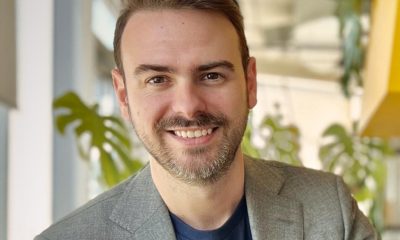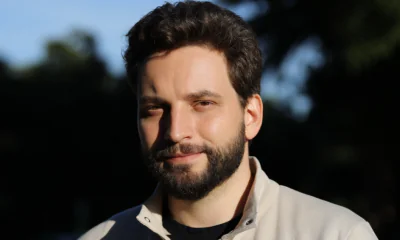Interviews
Jonathan Siddharth, CEO & Founder of Turing – Interview Series

Jonathan Siddharth, is the CEO & Founder of Turing a data-science-driven deep jobs platform helping companies spin up their engineering teams in the cloud at the push of a button. Based in Palo Alto, California, they are a fully remote company of 400+ people who help connect world-class remote software engineers with world-class companies.
Could you share with us the genesis story behind Turing and how it relates to the first company that you launched called Rover?
The moment of inception for Turing was 2012—I remember that year distinctly because I was running my first startup and I thought we were going to fail. We needed to raise our Series A and every VC on Sandhill Rd was turning us down because, although we had web traffic, my investors wanted to see mobile app traction. At the time, we didn’t have a mobile app out.
I needed to hire an Android and iOS engineer quickly, but every engineer I wanted to hire from big tech companies was turning us down. I quickly recognized that we’d have to change our way of hiring in order to succeed. My co-founder Vijay and I decided to look beyond Silicon Valley and hired some incredible engineers from Ukraine, Serbia, and China. This change was key and we were able to launch our mobile app which was recognized by Apple as one of the best apps in their app store.
After leading the company to a successful exit, I teamed up with my co-founder Vijay once again and began building Turing. By 2018, the engineering hiring problem I had experienced in my first startup had become significantly more acute. The secret was to find Silicon Valley caliber developers but at a global scale. We started with a massively oversubscribed seed round and have been in a hyper growth phase throughout our history. The pandemic accelerated the world’s shift to a remote-first world and the rest is history. We became a unicorn with our Series D round last year.
What are some existing obstacles behind companies going remote?
Now, the world that we live in is remote-first. Every company is in a race to reap the benefits of remote engineering talent. However, this transition to remote work is hard. This is because companies first need to build a sufficiently large global pipeline to identify great talent. Once this is established, then they need to vet remote candidates at scale without sucking up all the bandwidth of their existing engineering team. Lastly, they need to ensure remote software development is easy, doesn’t get bogged down with communication/timezone issues, is compliant and secure.
We asked ourselves a simple question: what if we could solve all of this with software?
This is why we built Turing. We are creating a new category called the Talent Cloud. This enables companies to spin up their engineering dream team in the cloud, as easily as spinning up servers on AWS. Turing is the world’s largest intelligent talent cloud that uses AI to intelligently source, vet, match and manage over 1 million developers.
Can you describe how Turing compares to legacy outsourcing marketplaces such as Upwork?
Recruiting marketplaces are hit or miss in terms of quality. This is time intensive for companies as it translates to lots of time spent wading through talent profiles and interviewing to vet potential talent. Additionally, marketplaces usually focus on gig workers often focused on short-term projects or part-time work, thereby making it even more difficult for companies seeking commitment for long term projects and engagements.
With Turing, all developers are rigorously pre-vetted for a Silicon Valley bar, saving companies a ton of interviewing time: typically 50 hours per hire. Sophisticated machine learning algorithms match the right developers to the right jobs which further increases speed to hire. Once matched, customers enjoy a 97% success rate in the engagement. We have a long-term view with developers. We are building the world’s most developer-centric company and take the privilege of growing developer careers very seriously. This attracts the best and brightest to Turing from all over the world.
Can you discuss what the vetting process is for developers, and what are the standards that engineers need to pass in order to be on the Turing platform?
Our advanced vetting engine evaluates global developers for a Silicon Valley bar. Turing’s vetting engine was designed by engineering leaders from companies such as Facebook, Google and Microsoft. To enable successful vetting, we use detailed and continuously updated deep developer profiles to understand developer strengths and areas for growth. Therefore, a Turing deep developer profile is a lot richer than a typical resume or Linkedin profile.
We evaluate developers for technical skills, soft skills and seniority level. Technical skills assessment include CS foundations, systems design, expertise in specific tech stacks and raw coding proficiency. Coding skills are automatically evaluated and recorded in the cloud, which makes it easy for a hiring manager to review later.
We are also the first and only platform that assesses developers for soft skills like communication, ownership, and leadership. This is particularly important for remote work. Our systems also automatically assess the seniority level of the developer and can level them as ICs, Tech Leads, Tech Lead Managers, Engineering Managers, Directors etc.
The entire process takes 2 to 5 hours and is time efficient for the developer. Turing’s use of machine learning makes our vetting and matching processes accurate and effective. Our vetting process collects tens of thousands of signals per developer and these signals are combined by machine learning algorithms to connect the right developers to the right jobs.
Turing is a bit of a turnkey solution, what else does the platform offer besides sourcing developers?
Turing lets you “push a button” to spin up your engineering dream team in the cloud. Our intelligent talent cloud vertically integrates sourcing, vetting, matching and post-match quality control. Turing’s post-match quality control solves for communication, transparency, performance management and security which are important for success of a distributed team. We are building new products to make it easy to bring up larger teams on Turing.
What are some ways that the Turing platform itself uses machine learning and AI?
Our powerful machine learning and AI technology are most clearly seen in vetting and matching.
For vetting, our advanced AI powered vetting engine creates a deep developer profile for every engineer. This is a detailed, comprehensive, and continuously updated representation of developers’ strengths and areas for growth. It’s the world’s best representation of a developer’s productivity. It highlights areas in which developers excel and is a lot richer than a typical resume or Linkedin profile.
For matching, our deep matching algorithms make optimal matches between the right developers and the right jobs with our machine learning technology and large amounts of data. Turing’s Talent Cloud captures performance reviews from every prior manager that the developer has had. These reviews provide scores on their strengths as well as their areas for growth. Turing is able to use on-the-job performance data to make highly accurate matches.
Turing’s intelligent matching algorithm is based on deep, end-to-end data about the job requirements and the developer skill set. We leverage signals from our vetting engine as well as actual on-the-job performance data to make granular matches. We benefit from leveraging tons and tons of training data our matching systems generate. We know which developers tend to succeed in which types of roles. Our matching engine gets smarter and smarter as it gets used by more and more companies all over the world.
Finally, we use machine learning to build models that weight the different features of the job and the developer’s deep profile to find the best match that ensures success for both the customer and the developer. When recommendations deliver matches with very high precision, companies don’t have to spend time interviewing a lot of developers.
Turing was recently successful at raising $87M at a $1.1B valuation. What’s the next step for Turing?
Our mission at Turing is to unleash the world’s untapped human potential. This unicorn-qualifying status round is an exciting milestone but we’re just getting started. We are building Earth’s most developer centric company. We want Turing to be the best place in the world for engineers to work. With this round, we are rapidly scaling our global developer base. Today, we have over a million developers signed up already from 140 countries. We have a lot of exciting features and initiatives planned for the talent cloud that will shatter the geo lottery and connect the world’s best developers with the opportunities that their talent deserves.
We’re hiring across all functions in our company – product, engineering, sales, developer community, finance, people – come join us!
What is your vision for Turing in 5 years?
Before Turing, an individual’s ability to contribute was limited by geography. In other words, jobs were limited by the zip code in which you were born. Not any more. We have shattered the geo lottery permanently. Today, if you’re a talented software developer don’t have to move to where the jobs are. The jobs come to you.
Bridging this talent-opportunity gap and eliminating the geo lottery is amazing for accelerating global progress. I am excited for all the new amazing inventions, products, drugs, tools and innovations we will see as a result of this shift.
We are experiencing a generational shift in the way we work, right before our eyes. We are fortunate to be building a platform right at the heart of this shift. In 5 years, we’ll be one step closer to making the world a better place by unleashing the world’s untapped human potential.
Thank you for the great interview, I personally look forward to hiring developers using Turing in the future. Readers who wish to learn more should visit Turing.












